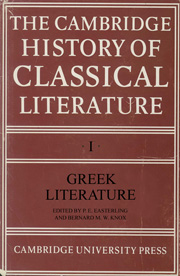Book contents
- Frontmatter
- 1 Books and readers in the Greek world
- 2 Homer
- 3 Hesiod
- 4 The epic tradition after Homer and Hesiod
- 5 Elegy and iambus
- 6 Archaic choral lyric
- 7 Monody
- 8 Choral lyric in the fifth century
- 9 Early Greek philosophy
- 10 Tragedy
- 11 The satyr play
- 12 Comedy
- 13 Historiography
- 14 Sophists and physicians of the Greek enlightenment
- 15 Plato and the Socratic work of Xenophon
- 16 Oratory
- 17 Aristotle
- 18 Hellenistic poetry
- 19 Post-Aristotelian philosophy
- 20 The literature of the Empire
- 21 Epilogue
- Appendix of authors and works
- Metrical appendix
- Works Cited in the Text
- References
21 - Epilogue
Published online by Cambridge University Press: 28 March 2008
- Frontmatter
- 1 Books and readers in the Greek world
- 2 Homer
- 3 Hesiod
- 4 The epic tradition after Homer and Hesiod
- 5 Elegy and iambus
- 6 Archaic choral lyric
- 7 Monody
- 8 Choral lyric in the fifth century
- 9 Early Greek philosophy
- 10 Tragedy
- 11 The satyr play
- 12 Comedy
- 13 Historiography
- 14 Sophists and physicians of the Greek enlightenment
- 15 Plato and the Socratic work of Xenophon
- 16 Oratory
- 17 Aristotle
- 18 Hellenistic poetry
- 19 Post-Aristotelian philosophy
- 20 The literature of the Empire
- 21 Epilogue
- Appendix of authors and works
- Metrical appendix
- Works Cited in the Text
- References
Summary
With the possible exception of Heliodorus (see above, p. 696), the active careers of the writers discussed in this volume all came to a close before the end of the third century A.D. This does not mean, of course, that Greek literary production stopped; on the contrary, expert estimates of the word-count for extant Greek literature run at about 19,000,000 for the period up to A.D. 200 and 70,000,000 for the next four centuries. But little of what was written in Greek after the middle of the third century A.D. can be considered ‘classical’ in any sense of that elastic term, and most of it hardly qualifies as ‘literature’ at all.
The middle years of the third century were a critical period in which many must have doubted that Graeco-Roman civilization could long survive.
Between A.D. 218 and 268 about fifty usurpers assumed the imperial title, either at the capital or in some other part of the empire; and of the twenty-seven ‘regular’ emperors of the third century (insofar as they can be distinguished from usurpers) seventeen were killed by their own people — all but one of them by the troops — and two of the others were forced to commit suicide.
The administrative, military and financial chaos which resulted from this anarchy encouraged the inroads of the barbarian peoples who had long been threatening (and infiltrating) the Roman frontier: Sassanian Persia to the east overran Roman territory as far as Antioch (and in 260 captured the Emperor Valerian), while to the north and west Goths and Franks broke the barriers of the Danube and the Rhine, to bring devastation to the Balkans, Greece, Gaul and Spain.
- Type
- Chapter
- Information
- The Cambridge History of Classical Literature , pp. 714 - 718Publisher: Cambridge University PressPrint publication year: 1985

